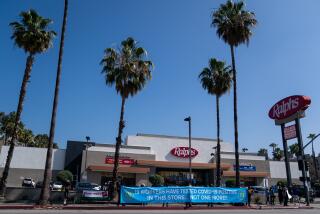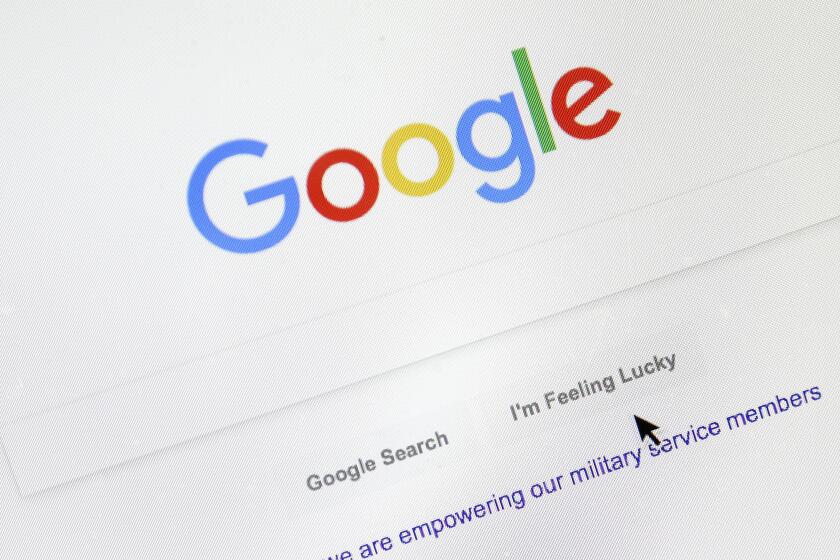Employers are using Facebook to target job ads exclusively to men, complaint alleges
Three female job hunters, a large worker coalition and the American Civil Liberties Union lodged a legal complaint against Facebook Inc. on Tuesday, accusing the company of enabling discriminatory job postings with its ad-targeting tools.
The complaint also names 10 employers that used Facebook to post job ads — for roles as police officers, truck drivers and sales representatives at a sports store — that were exclusively targeted to men, according to images of ads in the complaint.
The complaint with the federal Equal Employment Opportunity Commission is the latest of several legal efforts that take aim at Facebook’s core business of targeting advertising to highly tailored groups of people, a model that made the Menlo Park, Calif., company more than $13 billion in revenue last quarter.
The groups bringing the charges, including the 700,000-member Communications Workers of America union, argue that longstanding civil rights laws that protect people from discrimination are being routinely broken as more job and housing searches move online.
“There is no place for discrimination on Facebook; it’s strictly prohibited in our policies,” Facebook spokesman Andy Stone said. “We look forward to defending our practices once we have an opportunity to review the complaint.”
Federal laws prohibit employers, lenders, insurers and landlords from excluding people from advertising on the basis of “protected categories,” which include gender, race, national origin, religion, age, military status, disability and sexual orientation.
The practice of targeting online ads by demographics has become standard for nearly every internet company that sells ads. But Facebook — the only tech company named in the suit — is more vulnerable to these accusations because its microtargeting capabilities go beyond those of its rivals and because the social network gives people the option to learn why they are seeing a particular ad.
That “Why am I seeing this?” feature led the ACLU lawyers to bring the suit. To conduct the investigation, the ACLU and lawyers from Washington law firm Outten & Golden had Facebook users indicate that they were interested in looking for a job by conducting searches on various job-hunting websites and on the social network. The job ads from the 10 employers named in the complaint popped up in the news feeds of men but not women, the ACLU said. When the men clicked on Facebook’s “Why am I seeing this?” feature, they could see that the ads were targeted to them in part because of their gender.
“Our primary focus is to build the most talented and most dedicated team in the industry, regardless of who those folks might be, so that we can best serve our customers,” Renewal by Andersen, one of the employers who had targeted male construction workers, said in a statement. “We are an equal opportunity employer, and we are proud of the diversity of our workforce.”
In March, fair housing groups filed a lawsuit in federal court in New York arguing that Facebook allowed landlords and real estate companies to illegally tailor their ads to discriminate against protected categories of people. In July, Facebook signed a settlement with the attorney general of Washington state in which it promised to build technology that would guarantee that ads for housing, employment, insurance and credit can’t be hidden from users of a particular national origin, military status, disability, religion or race — and the company said it would take responsibility if such ads were inappropriately targeted.
Last year, Outten & Golden brought an EEOC complaint against several employers who had used Facebook to target ads that excluded older workers. That case is pending with the agency. If the agency certifies the complaint, the law firms plan to bring a case in federal court.
If these legal actions prevail, they will represent another setback for Silicon Valley companies, which historically have been shielded from legal responsibility when others abuse their services. Those decades-old protections, known as Section 230 of the Communications Decency Act, are being reevaluated by lawmakers and policymakers across the political spectrum.
Targeting online ads effectively repeals protections that were put in place in the 1960s, when courts ruling on recently passed civil rights legislation decided that newspaper classified ads were not allowed to market employment opportunities to only one gender, said Galen Sherwin, senior staff attorney with the ACLU’s Women’s Rights Project.
“This type of targeting is as illegal now as it was in 1964 when the Civil Rights Act was passed,” said Sherwin. “My first response when I saw these ads was: This can’t be true. This can’t be allowed to happen.”
Dwoskin writes for the Washington Post.






